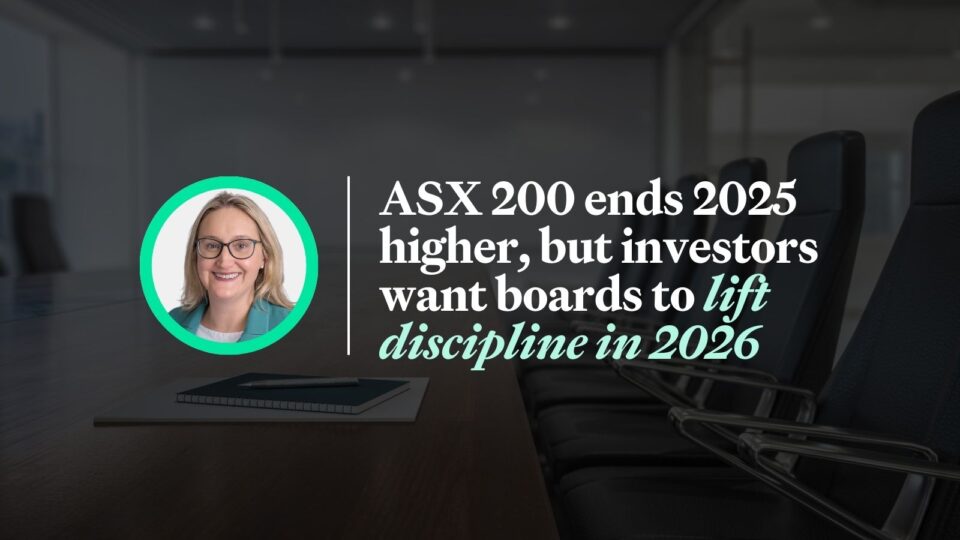
By Rachel Waterhouse, CEO, Australian Shareholders’ Association
Retail shareholders have expressed confidence in the sharemarket’s likely performance over the next 12 months. More than 60% of respondents to the Australian Shareholders’ Association (ASA) Investor Sentiment Survey said they were somewhat or very confident, with only 15% expressing doubts.
These results show how investors are responding to a perceived increase in transparency and accountability from publicly listed entities. Companies such as Lovisa, Adairs, and Sigma are gaining support thanks to clear commentary and openness about results. This is in stark contrast to Woolworths, where poor performance has been compounded by the absence of a cohesive recovery story.
Shareholders understand that companies face headwinds. But without a clear strategic narrative, backed by a tangible response plan, confidence is likely to falter. Results matter, but so does transparent, forward-looking communication, where leaders own their problems and show that they have a credible strategy to address them.
Overall, ASA members were not surprised by company earnings this season, and one in three respondents thought the market had performed better than expected.
“Nothing up my sleeve!”
But that does not mean that everything is rosy and all news is good news. Survey respondents raised concerns about volatility and communication gaps.
For many retail investors, the combination of earnings pressure and governance concerns has reinforced frustration that company disclosure and context are not always in line with market reactions. Modest misses at CSL triggered outsized share price movements. James Hardie’s results fell well short of expectations, leading investors and analysts to question whether the risks had been communicated clearly and early enough. Woolworths has pointed to external pressures such as competition, supply chain disruption and rising costs, rather than acknowledging management’s role in its performance slump.
The lesson here is that results are important, but not everything. Companies that acknowledge issues are more likely to be recognised for their transparency. Companies that hide problems reduce trust, much like a child leaving one biscuit in the packet to pretend they haven’t eaten them all.
This undermines confidence and can generate sharp market swings in the face of light, or even absent, management commentary. Put simply, poor communication can shake confidence just as much as a poor number, because it leaves too much room for speculation.
“Step forward with (cautious) confidence!”
Despite short-term swings and some apparent reluctance to be fully transparent, the survey shows investors remain engaged and reasonably optimistic.
There are plenty of challenges: global political risks, inflationary impacts, supply chain disruption, cost-of-living pressures, lower retail margins, and questions over the sustainability of bank earnings. Yet while these risks remain, there are no signs of investors pulling back from equity markets.
Instead, retail investors are weighing risks more carefully and paying closer attention to how boards and executives explain their strategic direction. Trust, but verify.
Under the microscope
When asked which sector surprised them most, 28 percent nominated healthcare, followed by consumer discretionary at 19 percent and financials at 17 percent. While investors expected challenges in retail and banking, it was healthcare, traditionally seen as defensive, that delivered the biggest surprise.
Reporting season showed that every sector is vulnerable if performance and disclosure fall out of step.
To have, or to hold…
According to respondents, portfolio behaviour was mixed. Eighteen percent had already adjusted their holdings in response to results, 37% were considering changes, and 45% were holding steady.
Reporting season remains an opportunity to reassess positions, but approaches differ. Some investors move quickly to create opportunities, while others remain patient and exercise discipline. Both approaches have strengths and weaknesses, but when confidence wanes, decisions shift more rapidly.
Retail investors want more than headline numbers. They want clarity on the quality and sustainability of earnings, consistent updates on strategy, and honesty about how global and domestic risks are likely to affect performance. They want to know what could impact their investment, and how management intends to mitigate risks.
As one member put it bluntly: “Companies are meeting the minimum, but that is not transparency.”
The bottom line
Retail investors are pragmatic. They understand risks, expect volatility, and accept that results will vary across sectors. But they are also clear about what they want: companies that communicate honestly, acknowledge challenges, and provide the context investors need to make informed decisions.
Candour leads to confidence. Confidence builds trust. And trust underpins the long-term strength of Australia’s sharemarket.
General disclaimer: This information is for general informational purposes only and does not constitute financial advice or a recommendation.






